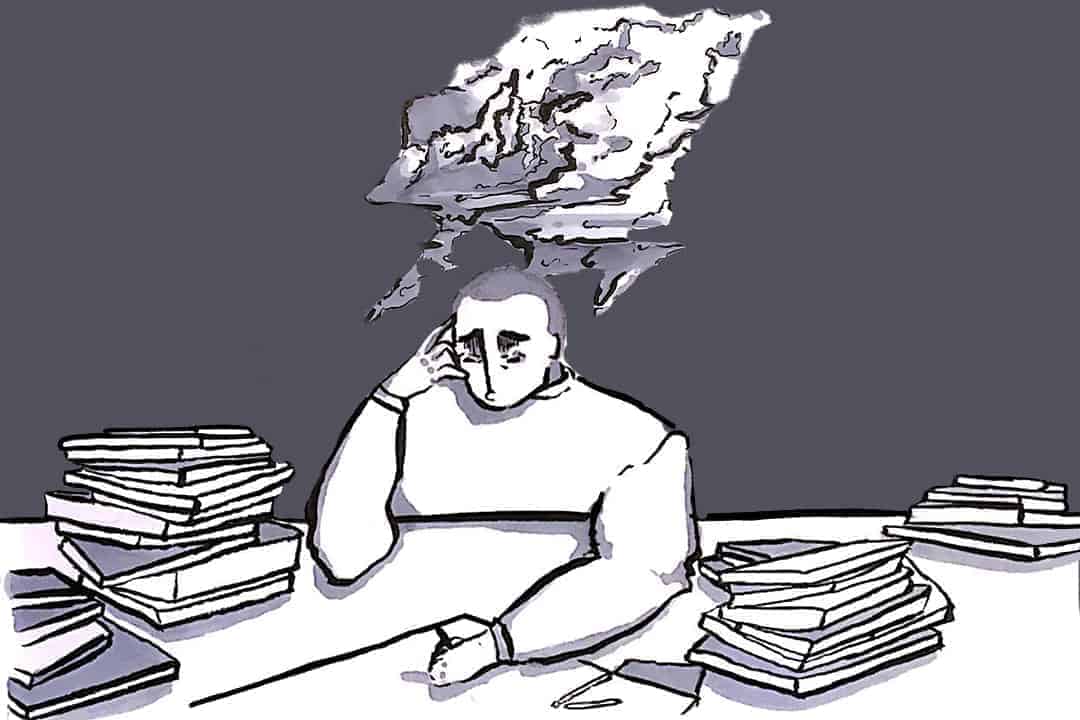“Just one more week.”
That’s a phrase I hear a lot from my peers during exam and essay season. The endless stream of quizzes and papers — followed by one more quiz because your professor thought the last one didn’t quite meet their standards — can be maddening.
Combine that with the dreaded productivity slump, and you’ve got yourself the perfect storm. You know exactly the storm I’m writing about. It’s the type of storm where you wake up one morning and proudly proclaim to the newly formed day that yes, you are going to write those four essays and write that one quiz released at 5:57 pm and due at 1:07 am on Quercus today. But then, after listening to your motivation playlist 50 times and chugging eight shots of espresso, you eventually end up doom-scrolling and screwing around on social media.
After that, the emptiness sets in. There comes the cold, creeping feeling of failure, dread, and whatever other nasty emotion crawling out of your subconscious. But why? Why do we feel that way? Why does neglecting one measly quiz about some long-dead guy called Louis LXIX completely redefine our self-worth? How does not writing down the introduction for our paper on the Emu War completely sap our willpower?
The concept of the Protestant work ethic, that’s how.
So what is the Protestant work ethic?
The Protestant work ethic is a concept coined in 1905 by the German sociologist Max Weber in his book The Protestant Ethic and the Spirit of Capitalism. Weber argues that the idea of predestination, proposed by the Protestant reformer John Calvin, motivated people to work harder to demonstrate they were one of the “elect.” The elect, according to Calvin’s theology, is a group of people who are predestined to be saved by Jesus Christ and whisked away to heaven while everyone else burns for all eternity.
Cheery, right?
How can one find out if they are part of this special group that was “elected” to go to heaven? According to Calvin, if someone is successful and any number of other things, including hard working, they could very well be part of the elect. The idea of predestination, Weber argues, motivated the development of capitalism, which then perpetuated the mythology of the Protestant work ethic. This mythology, created over centuries suggests that the only type of good work is hard work and that buying into that idea will ‘save’ you.
The reasoning then is that working hard is the same as being morally good. If you are a hard worker, you must be chosen by God, which therefore means that you are going to heaven. We see this type of thinking most obviously in some opinions on people without housing. Under the lens of the Protestant work ethic, those without housing may appear lazy, which is a moral failing; it’s a sign that you are not one of the elect and means, to some extent, that you deserve what you get.
You might be thinking, how the hell does this apply to me?
Well, the Protestant work ethic permeates our society and, as a result, affects our lives at U of T. Not only that, but it also creates a toxic mindset for the individual. The idea that your worth is determined by your productivity stems from the Protestant work ethic. That ever-creeping sense of dread I mentioned before doesn’t just result from any evolutionarily developed instinct but also from our cultural values.
And that can have damaging effects.
Dealing with ethics
For me, the Protestant work ethic has been fairly difficult to deal with. I’ve been described as a hard worker by my peers and family, but that comes with the price of always feeling like I’m not doing enough. I have the constant nagging feeling that “I should be writing a short story” or “I should be cleaning every square inch of this house.” Those thoughts can be bothersome when all we really need is some rest and relaxation. And that’s just how I feel in my spare time.
When it comes to university, that feeling is cranked up to 11. Even if you’ve been diligently doing readings and taking notes for six hours, you still feel like you should write at least 1999 words of that 2000-word paper due in two months’ time.
Ultimately, the Protestant work ethic can be counterproductive, despite its supposed goal to promote salvation through hard work. People aren’t machines that can work 24 hours a day; we get burned out. The Protestant work ethic doesn’t take this into account, so it ends up creating a vicious cycle of working until you’re burned out and left feeling terrible for not being productive enough.
So, how can we deal with this mental health-shattering ethic? On an individual level, we can acknowledge that it’s normal to have peaks and valleys of productivity. We can’t be working all the time and we need our rest to be able to do our best. University is a marathon, not a sprint, and we must respond accordingly.
Another thing we can do is recognize that the Protestant work ethic is just one way to approach a problem. Sometimes working hard is not the best way to deal with a challenge; sometimes, we have to work smart. Finding little shortcuts to dealing with large workloads, for example, is crucial to doing well. Ploughing through it can help sometimes but not always, and tying our value to what we can produce within a short period of time can do significant harm to our mental health.
Now, if you’ll pardon me, I’ve got about six more articles I have to write and eight intern applications I’m behind on.


